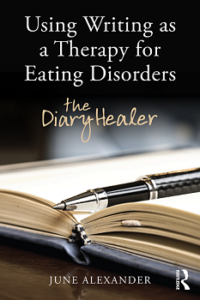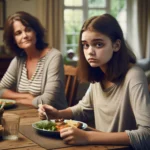The dark, dark secret that makes an eating disorder so hard to beat, and treat
The dark, dark secret that makes an eating disorder so hard to beat, and treat

By June Alexander
To heal from my eating disorder I had to clear my inner self of a minefield of secrets. Facing and fighting an invisible enemy that since childhood had kept my focus “out there” (on food, temptations, diet, exercise) was terrifying.
Jennifer was terrified, too. She did not want to worry her family and friends about her eating disorder, which emerged when she was 44 years old. Having functioned mostly well until this time, she hoped to continue to manage both illness and life on her own. She coped until she suffered several miscarriages. In attempting to come to terms with this deep sadness, a suppressed dynamic, relating to childhood sexual abuse, was eventually revealed:
… Fearful for others’ safety, I had kept this truth from everyone. – Jennifer
Only after several relapses did Jennifer realize that to recover, she needed to reveal and address her innermost, darkest secret. She first shared the long-held pain with her treatment team with whom she had developed a sense of trust. For the first time in 40 years she began to talk about what happened in childhood, and the walls of secrecy that had fed her eating disorder for all those years slowly crumbled.
Jennifer found journaling to be helpful in healing from her eating disorder and, together with others and myself, shares her story in Using Writing as a Therapy for Eating Disorders – the Diary Healer, the creative work in my PhD. This Dear Diary entry draws on this book.
Secrets in the family
Complications with an eating disorder can increase when, besides eating disorder secrets, there are family secrets. An awareness of secrets in my family began to emerge in my early 30’s, each revelation providing a clue for re-piecing the shattered jigsaw that was “me.” Through a phone call from my sister, I learnt details of sexual abuse that occurred in our early childhood.
This startling information helped to explain family behaviors that had bewildered me for years. Now this secret had surfaced, I wanted and needed to talk to close others, especially our parents, to heal wounds and seek justice, but my sister discouraged this (“We would only upset them, and Mom might have a heart attack”). The behavior developed in childhood therefore continued; my diary became loaded with more secrets, now as a refuge in trying to come to terms with the pain of knowing more but only part of the story.
In my late 40’s, seventeen years after the first disclosure of sexual abuse, another fragment of this secret was revealed. The sudden death of my sister’s husband was the unlikely catalyst, the secret childhood trauma being totally unrelated to him.
The morning after the funeral, in my parents’ farmhouse kitchen, one comment led to another. Until now I understood my parents were unaware of the abuse, and that my sister and I had been protecting them from the pain. Yet here they were disclosing they did know. I was shocked to the core, for they always welcomed the abuser, a relative, into their home. Worse, after that momentary revelation that day, everything closed up again. Lips sealed. No action taken. No wounds cleansed or tended to, no family or self‑healing possible.
My diary recorded:
“I feel my heart has been wrenched and ripped from my body.”
| The secrets about abuse were concealed in layers that I needed to address to recover from my eating disorder. As Imber-Black notes in The Secret Life of Families, in many families where eating disorders develop, true individuality and painfully unacknowledged wants and yearnings may be hidden under layers of perfectionism and a defensive focus on appearances, social standing, and proprieties. This was my experience. Secrets had been suppressed in my family, by parents who were highly respected in their community, for years. |
Not until middle age did I have sufficient information to reflect on and understand that in my childhood, the family secret of sexual abuse, of which I was not consciously aware, had preceded development of my eating disorder, also of which initially I was not consciously aware. Disengagement with self, began early.
Reflection on journal outpourings assists healing
The genetic and environmental stage was set for traumatic times as I entered adolescence and adulthood. Although my diary was an unwitting accomplice to my eating disorder, it also was a vital survival and learning tool. As recovery edged forward, reflection on the anguish, frustration and confusion that had filled the pages of years of diary-writing, helped me to see how and why my illness had developed, and to accept the eating disorder was an illness, not a weakness or “choice.”
Eating disorders and sexual abuse
| There has been much discussion and research on whether sexual abuse and other forms of abuse are linked in any way to the development of eating disorders. So far, however, there are no known or established risk factors that are specific to eating disorders—none.
What is known, Dr Tim Brewerton explains, is that when sexual abuse is present it makes the illness a lot worse, more complex and harder to treat. Professor Michael Levine makes this point: Sexual abuse does not have a specific connection to eating disorders, but sexual abuse, in general increases the probability of a host of problems, many of which are co-morbid with eating disorders. Such problems may include: Post Traumatic Stress Disorder (PTSD), depression, substance abuse and personality disorder (e.g., borderline personality disorder). So, sexual abuse per se does not seem to have a particularly strong direct connection with eating disorders; however, combinations of different types of abuse are more likely to have links. Professor Ulrike Schmidt helps to explain why: …. sexual abuse alone is very heterogeneous and sometimes people have a one-off, less severe sexual abuse experience (buffered by a loving home environment where they can confide and get appropriate support) and this may not be not particularly noxious to the individual. In contrast where people have been exposed to repeated abuse or combinations of multiple forms of abuse this almost invariably suggests poorer quality childhood environment. So when one thinks about abuse and its link to later eating disorders or other disorders one also needs to think about other contextual factors that may have made things better or worse (such as was the person able to confide and were they believed and supported). Dr Timothy Brewerton comments further: A wealth of scientific literature has emerged over the past couple of decades documenting that significant trauma of any kind is a causative risk factor for the development of all forms of bulimic eating disorders (AN-binge purge type, BN, BED, and probably purging disorder as well). The restricting form of AN does not appear to be associated with higher rates of prior abuse compared to the general population; however, AN-R represents a very small percentage of the total eating disordered population. |
Letting people in
Jennifer’s story demonstrates that gaining trust and sharing with others in a safe environment can be a vital first step toward healing. A major turning point in Ellie’s recovery of self occurred when her therapist challenged and questioned: “Why don’t you just surrender to trust, to letting people in?”
Within this realization was the knowing that I had to open to myself: my own voice and my own ways, also. To no longer being willing to minimize myself for the benefit of others that was so much to my own detriment. In letting others in, I had to show up fully too, with trust and a belief that I would be okay, no matter what. – Ellie
Ellie describes this new awareness
iSurrender
iSurrender
to a life that is worth living,
my existence not to be questioned.
i will fill the space I reside in,
that I am worthy of.
to no more hiding.
… iSurrender …
to a life of new depths and tones,
to colours more suggestive of light than darkness.
to threads of opportunity and connections that are safe.
to embracing life in its entirety.
.within this surrender I will not be lost.
… iSurrender.
iSurrender myself in order to be free.
– Ellie
See Using Writing as a Therapy for Eating Disorders – the Diary Healer, the creative work in my PhD, for insights on the effect of sexual abuse in those who develop an eating disorder, and on how the diary can be integrated into treatment and recovery. For details, see www.lifestoriesdiary.com or go to http://acquire.cqu.edu.au:8080/vital/access/manager/Repository/cqu:13833

References
Brewerton, T. D. (2004). Eating disorders, victimization and PTSD: Principles of treatment. In T. D. Brewerton, (Ed.), Clinical Handbook of Eating Disorders: An Integrated Approach. New York: Marcel Dekker, Inc., pp. 509–545.
Brewerton, T. D. (2007). Eating disorders, trauma and comorbidity: Focus on PTSD. Eating Disorders: The Journal of Treatment and Prevention. 15. 285–304.
Brewerton, T. D., Dennis, A. B. (2016). Perpetuating factors in severe and enduring anorexia nervosa. In S. Touyz, D. Le Grange, P. Hay, H. Lacey, (Eds.), Managing Severe and Enduring Anorexia Nervosa: A Clinician’s Guide. New York, USA: Routledge.
Brewerton, T. D., Rance, S. J., Dansky, B. S., O’Neil, P. M., & Kilpatrick, D. G. (2014). A comparison of women with child-adolescent versus adult onset binge eating: Results from the National Women’s Study. International Journal of Eating Disorders, 47(7), 836–843. doi:10.1002/eat.22309.
Mitchell, K, Mazzeo, S. E., Schlesinger, M. R., Brewerton, T. D., & Smith, B. R. (2012). Comorbidity of partial and subthreshold PTSD among men and women with eating disorders in the National Comorbidity Survey-Replication Study. International Journal of Eating Disorders, 45. 307–315.
Recommended reading
Imber-Black, E. (1999). The secret life of families: Making decisions about secrets: When keeping secrets can harm you, when keeping secrets can heal you—and how to know the difference. New York: Bantam Books.
Next week, Amanda will share her story of abuse, which began at the age of three.






The Jennifer in the first paragraph is me. June, this is the first time I have seen this since it was published. It is so.powerful, and I feel truly honored. Thank you for allowing me to be a part of your important work.
Dear Jennifer, I am delighted to hear from you and hope that you are enjoying life to the full today. I often think of you and the other 69 brave people with lived experience of an ED and experience of journaling, who courageously set out on the PhD ‘Diary Healer’ journey with me. My life is enriched with this shared experience and I hope you feel the same way. With love, June